The end is near for analogue radio... Part 3, satellite Freeview online and DAB
 Brian Butterworth published on UK Free TV
Brian Butterworth published on UK Free TV Radio in the Sky
Looking back to Astra UK Channels in 1997, we can see one interesting development for radio was the inclusion of the BBC Radio services on the Astra 1 analogue TV service.As each transponder could carry six associated audio feeds, UK Gold had BBC World Service and Radios 2, 4 and 5 Live in mono, and Living carried Radios 1 and 3 in stereo. In addition, Virgin Radio, which was a mono AM service could be heard in stereo from the Astra 1 satellites.
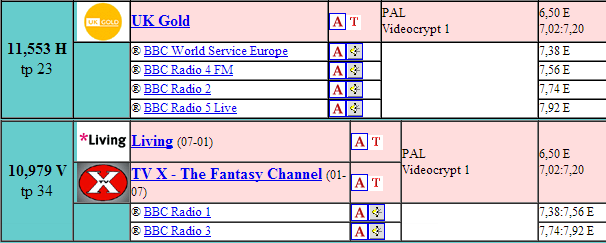
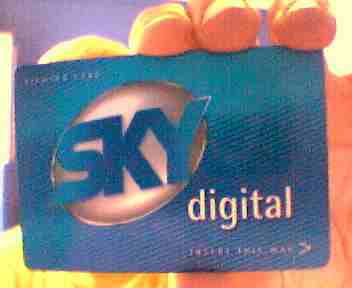 For this reason, it almost came by accident that on 1st October 1998, the new Sky Digital television service would also include lots of digital radio stations. With an abundance of capacity and the radio stations could take advantage of the MPEG2 layer III audio system (aka "MP3") and provide many radio stations in high quality stereo. The inclusion of radio stations in the channel numbers also meant that listeners could tune into radio stations without any difficult tuning issues.
For this reason, it almost came by accident that on 1st October 1998, the new Sky Digital television service would also include lots of digital radio stations. With an abundance of capacity and the radio stations could take advantage of the MPEG2 layer III audio system (aka "MP3") and provide many radio stations in high quality stereo. The inclusion of radio stations in the channel numbers also meant that listeners could tune into radio stations without any difficult tuning issues.
"Eureka"
Of course, the first "official" digital radio service developed out of the Eureka 147 project - see DAB: an introduction to the Eureka DAB System and a guide to how it works, which gave the world MPEG-1 layer II audio MPEG-1 Audio Layer II.The BBC started test transmissions of DAB in January 1990, and its national DAB multiplex went on air in 1995.
The DAB service was thought of as a way of supplying superior quality sound for the existing five BBC network radio stations. However, the very high cost of receivers, around £800 back in 1998 (£1200 in today's prices). The BBC launched digital radio in the UK in 1995 followed by national commercial multiplex operator Digital One in 1998.
"Extending Choice"
However, as early as 1992, the BBC had published "Extending Choice", which proposed that the BBC stop chasing mass audiences, and provide high quality services to audiences that the commercial broadcasters were not. This first camge to fruition in September, 1998 ( BBC News - ENTERTAINMENT - BBC unveils digital TV) when the BBC News 24, Choice and Knowledge channels were announced, and that DAB would soon have BBC Parliament (an audio service), the Asian Network and a side-channels to back-up Radio Five Live.Since then local DAB (digital radio) commercial services have become available offering non-national BBC Radio and ILR on a local basis.
Greg Dyke, the BBC DG in 2001 BBC News - TV AND RADIO - Dyke warns of digital backtrack made a decision to launch three new networks, codenamed X, Y and Z. These became 1Xtra, 6Music and BBC7 (see radio-now.co.uk )
This was a strategic decision to remove DAB from being a "sound quality" proposal to one of "listener choice". However, DAB radios still cost £300 (£420 at today's prices).
Radio Freeview
So, it was quite fortunate for these stations that the big digital terrestrial balls-up that had been ONdigital (see ONdigital Timeline - ONhistory for more) resulted in the BBC having two DTT multiplexes to fill when the replacement service Freeview launched.For quite some time, the second multiplex only carried BBC FOUR and Cbeebies, and there were plenty of bits left for all of the BBC national stations to be carried to most homes in very high quality.
As the new BBC radio stations came on air, they were also added to the digital satellite platform.
From 15 November 1999 the first national DAB commercial multiplex "Digital One" launched. This now adds another 15 national stations.
For those who are not happy with the provision of more services at lower bitrates, most UK radio stations can be listened to online at high quality. The unexpected popularity of listening to radio on Freeview has allowed many homes to sample stations that would otherwise have been exclusive to DAB. Now when people consider a DAB purchase, many "new" stations are already familiar.
The most recent figures show that 52.5% of the population tune in to digital radio every week: 65% of that is DAB, 15% on Freeview, Freesat and Sky, and 15% online. See RAJAR DATA RELEASE | QUARTER 2, 2013
How many people are listening on long and medium wave?
Due to the cuts imposed on the BBC from the Licence Fee being frozen, the BBC is looking into removing the Long and Medium Wave services.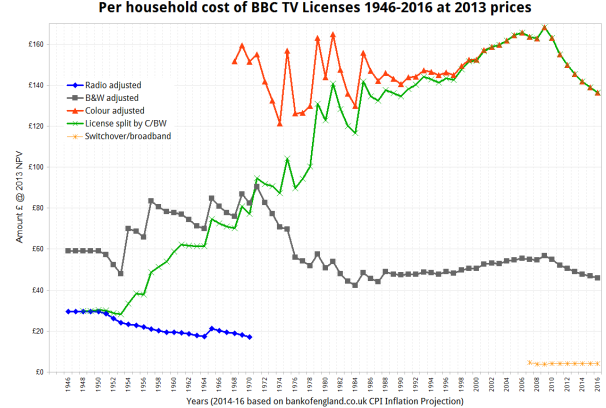
According to BBC News - BBC set to cut ... 2017 "There will also be no reinvestment in long wave, which will lead to the end of Radio 4 on LW in the long term".
"The BBC says the eventual closedown of the Long Wave service is determined not so much by the digital switchover but a dwindling supply of valves used by the Droitwich transmitter, owned and operated by Arqiva. At the last count there were only 10 left and their operating life is put at between one and 10 years" (from Will the move to digital cut off my long-wave radio? - Telegraph).
As part of the DQF process, four BBC local radio stations closed down on medium wave. At three of these there were no complaints, but at BBC Radio Mersyside, according to BBC criticised for AM radio shut-down - Media - theguardian.com 600 listeners complained.
Using this as a baseline, 600 listeners from a potential 1,664,000 (from RAJAR) pairs of ears, makes 0.0361% of the population.
If we multiply this up by 53,205,000 (that RAJAR national 16+ figure) we get 19,200.
If there are really only 19,200 people listening to long and medium wave, then it's probably time to turn off the service.
If you look at it the other way, then a service proposal to cover 20,000 people in the UK from 73 transmitters wouldn't be regarded as economic.
It may also be worth noting that if you can't get your BBC radio stations from DAB, or satellite, or Freeview, or online: it is doubtful you are paying for a TV Licence.
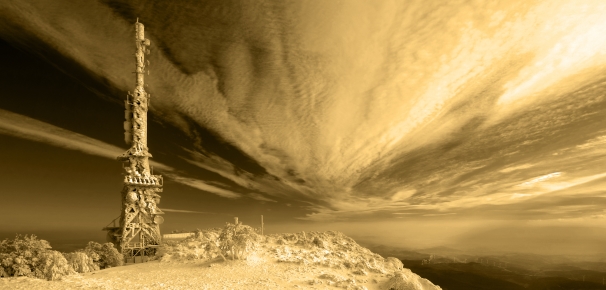
So why switch of FM/VHF?
In the last part, The end is near for analogue radio... radio gets very high - Digital radio the limited FM radio spectrum prevents the UK having more than 5 national FM stations.DAB, with just two national multiplexes provides 25 stations. There is space reserved for a second national DAB service, which could add another 15.
In London, there are an additional three DAB multiplexes adding brining the total stations to over 55. Central Scotland has 45 stations.
Over the last few years, the BBC and commercial operators have been making the DAB local radio network match the FM local radio network - Ofcom - Annex B. Local DAB build-out plans. There are still a few areas of the UK to cover - notably Derbyshire and West Wales - but both in car, and in home, DAB reception is as good as or better than FM.
But there are 758 FM transmitting masts in the UK, some carrying as many as 12 FM stations (Black Hill (North Lanarkshire, Scotland) analogue radio transmitter ) This is a considerable cost for the radio broadcasters because DAB is as low as one-sixth of the cost of FM transmission.
"Transmission will be cheaper, too. DAB can be transmitted at lower power than today's FM and AM signals yet with no loss in geographic coverage, which means less cost to the broadcaster (and less power consumption means DAB is more environmentally friendly than conventional FM and AM)." - WorldDMB - Frequently Asked Questions (FAQ)
The current plans are to announce a rolling switch off of VHF for the BBC and commercial broadcasters: the switch off will occur areas where digital radio use is highest. Community radio stations (which are not profit making) will continue on FM.
However, the recent success of the Small Scale DAB The potential for lower-cost transmitting stations in support of DAB rollout suggests that community radio could now be very cheaply provided by DAB too.
Now in 2013, you can grab a DAB radio from your local supermarket for £20 ASDA Portable DAB Radio - Radio - ASDA direct - one sixtieths of the cost in 1998, there is little standing in the way of radio choice being available in every UK home.
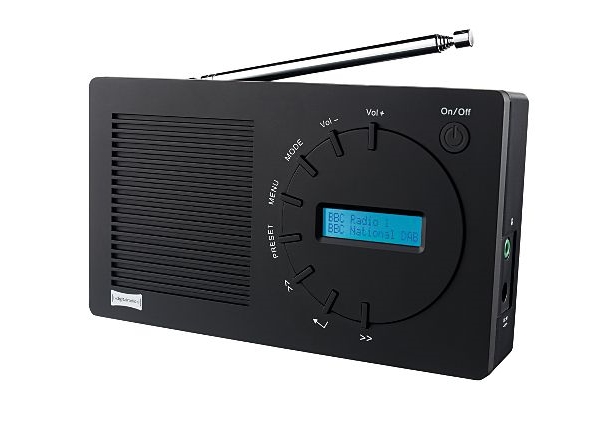
Help with TV/radio stations?
In this section
Sunday, 19 October 2014
M
michael10:43 PM
Mark : is a list of the new DAB transmitters with location and mux details online?
| link to this comment |
Monday, 20 October 2014
M
Mark12:35 PM
michael:
This page should give you the information:
BBC - DAB Phase 4 - Help Receiving TV and Radio
| link to this comment |
Monday, 10 November 2014
N
Nedbod7:05 PM
Michael : There is still no excuse for Radio 4 going into MONO on DAB most evenings, depriving licence fee payers of programmes they have paid for to be made in STEREO (such as Radio 4's flagship drama THE ARCHERS, FRONT ROW, ANY QUESTIONS & THE FRIDAY PLAY), but these RADIO programmes can only be heard in STEREO on the TV and on line and on FM. If FM is switched off most car drivers will only be able to hear these programmes in MONO. If BBC Radio 4 could broadcastb these programmes in STEREO up to and including 2012, why not now, especially when their former controller Jenny Abramski promised on Feedback with Roger Bolton that this would never happen (I still have a tape with her saying this).
| link to this comment |
Tuesday, 11 November 2014
M
michael10:17 AM
The analog switch-off discussion has gone eerily quiet. Is that good news or bad news? I tried a portable DAB+ radio in the new car. FM reception was better, even though the FM/AM radio in the new car is substandard. I am mildly surprised that so many similar music stations are evidently still commercially viable, both on FM and DAB. I had secretly hoped that the market would sort them out, thereby allowing high bitrates to the survivors.
| link to this comment |
Wednesday, 12 November 2014
MikeP
9:17 AM
9:17 AM
michael:
I've just moved to Trowbridge and find that DAB is very poor downstairs and only reasonable upstairs. It is poor in the back garden and fair at the front! FM is fine in all areas of the house and gardens.
I personally prefer the sound quality provided by FM analogue services, but then I have a musical history since joining a choir at the age of 8 some 60+ years ago!
| link to this comment |
Thursday, 13 November 2014
M
michael9:35 AM
Mike : Looks like there could be a booming niche-market for feng-shui gurus:-)
| link to this comment |
Select more comments
Your comment please!